In the words of Niccolò Machiavelli, "A prudent ruler cannot, and must not, honor his word when it places him at a disadvantage." This wisdom underscores the importance of authenticity in leadership. Nardelli's actions, though well-intentioned, were misguided and lacked the genuine commitment to transformation that true leaders must embody.
A false sense of urgency often characterizes transformation theater. This urgency can be leveraged to drive radical changes, such as liquidation of underperforming assets or significant headcount reductions. These measures, though drastic, can be necessary to streamline operations and boost financial performance. Machiavelli's advice to "never attempt to win by force what can be won by strategy" is particularly relevant here, as strategic liquidation and restructuring can be more effective than brute force in achieving financial gains.
A rushed process is another hallmark of transformation theater. This haste can be exploited to implement swift and decisive actions, such as divesting non-core businesses or aggressively cutting costs. These actions, though they may seem drastic, can be crucial in turning around a struggling company. As Machiavelli noted, "The lion cannot protect himself from traps, and the fox cannot defend himself from wolves. One must therefore be a fox to recognize traps, and a lion to frighten wolves." In this context, the fox's cunning and the lion's strength are metaphorical for the strategic and decisive actions needed to navigate the challenges of corporate transformation.
Lastly, a highly public rollout is often a feature of transformation theater. This publicity can be leveraged to create a perception of change, even if the underlying processes remain unchanged. By orchestrating a public spectacle of transformation, leaders can create a narrative that boosts stock prices and credit ratings, at least in the short term. Machiavelli's observation that "the one who adapts his policy to the times prospers, and accordingly the one whose policy clashes with the demands of the times does not" underscores the importance of aligning public perception with strategic goals.
In the end, transformation theater, though it may seem like a shortcut to success, is a dangerous game. It can lead to short-term gains but ultimately results in long-term failure. As Machiavelli so astutely observed, "The first method for estimating the intelligence of a ruler is to look at the men he has around him." The true test of leadership lies in the ability to surround oneself with wise and capable advisors who can navigate the complexities of genuine transformation.
